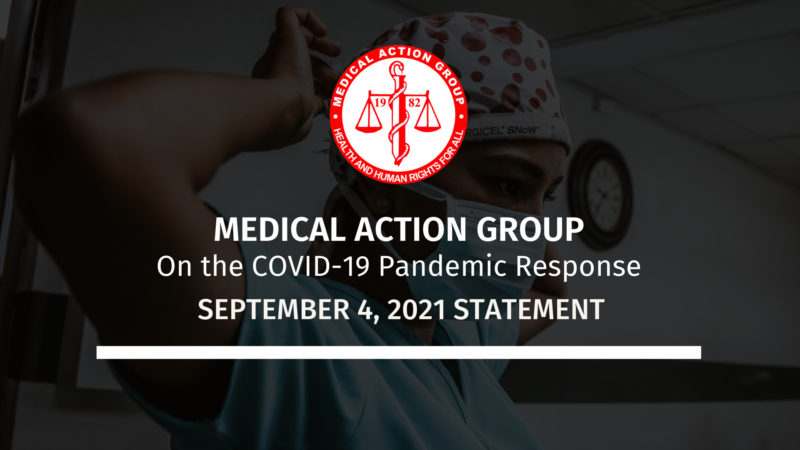MAG Statement
September 3, 2021
More than a year in lockdown, the Philippine government still needs to understand that the imposition of wide-scale lockdowns will not suffice in responding to the COVID-19 pandemic. By September 1, 2021, the Philippines recorded a total of two (2) million COVID-19 cases. With a population of 109 million people, only around 33 million doses have been administered, with 13.7 million individuals fully vaccinated, and 19.3 million got their 1st dose, as of August 29, 2021.
As the Philippine government continues to fall behind in supporting the overwhelmed health system, more and more lives of Filipinos are put at risk. The recent issue on misuse and underutilization of DOH funds and questionable COVID-19 supplies procurement, involving PhP 67 billion worth of COVID-19 funds has raised concerns on corruption within the health department. At the same time, reports of patients not able to access health services, whether for COVID-19 or not, due to overcapacity of hospitals have become common. The government needs to hasten crafting solutions in accordance with these realities in the grassroots and the health facilities. Specifically, this may include provision of additional life support equipment (e.g. ventilators and hospital oxygen supply), establishment of systematic contact tracing, integration of local and national referral systems such as the One Hospital Command Center to effectively coordinate COVID19 and non COVID19 cases, as well as faster vaccine rollouts.
Statements of groups of health workers demanding for their benefits have been widely spread in the media. Despite being hailed as the heroes of the pandemic, they receive inadequate government support forcing some to resign, seek employment abroad, experience low morale and add to that, physical and psychological exhaustion. Despite allocated funds as mandated by Republic Act 11469 and RA 11494 or the Bayanihan 1 and 2 Acts, as of September 1. 2021, over 100,000 health workers have not received their special risk allowance (SRA), meals, accommodation, and transportation (MAT) benefits. Despite this, the 2022 DOH budget has been slashed by 73% and allowances and benefits for the healthcare workers are nowhere to be found. With this budget cut, alongside the projection of 30,000 cases per day and slow vaccination rates in the country, DOH Secretary Duque still vehemently claims to achieve herd immunity by the first quarter of 2022
In the current COVID-19 response, the role of communities in helping formulate solutions have been minimal to none when their participation is equally important. Empowerment of local community members on the health protocols, as well as provision of support to the essential workforce, can help prevent further COVID-19 transmission. Laid off workers will suffer either by lack of social amelioration programs or the risk to their health by going outside. At the same time, proper engagement with the public transportation sector as well as local businesses, especially those with closed ventilation, can also help, since these are mostly the places that are prone to transmission.
Primary healthcare, which should have been the first line of defense in responding to the pandemic, continues to be inadequately equipped. Therefore, the Universal Health Care (UHC) Act should also be prioritized during these challenging times.
MAG demands the Philippine government to be accountable to the Filipino people by taking immediate, evidence-based, and rights-based measures in responding to the COVID-19 pandemic and upholding the rights of its health workers.
Strengthening the health system through proper health resource allocation, strengthening the referral and information systems, and promoting the welfare of its health workers, alongside provision of proper social and economic support measures and community engagement, should be done to protect and promote the rights of the Filipino people.

